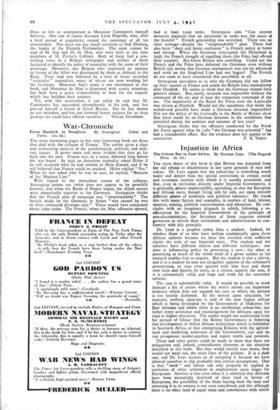War-Chronicle
From Dunkirk to Benghazi. By Strategicus. (Faber and
Faber. Ins. 6d.)
THE most interesting pages in this very interesting book are those that deal with the collapse of France. The author gives a clear and penetrating analysis of the psychological, political, and mili- tary causes. It grows more and more evident that they go far back into the past. France was, in a sense, defeated long before the war began. In 1932 an American journalist asked Hitler if he still accepted what he had written in Mein Kampf, and if he still believed that France could be crushed. Hitler replied " Yes." When he was asked why he was so sure, he replied, "Because of the Maginot Line."
With regard to the immediate causes of the collapse, Strategicus points out (what does not appear to be generally known), that when the Battle of France began, the Allied armies were numerically superior to the Germans. Strategicus thinks that the French plan of campaign was " irreproachable." The breach made by the Germans at Sedan "was caused by two or three armoured divisions only." These would have comprised about 1,600 tanks. The French, when the May offensive opened, had at least 2,000 tanks. Strategicus asks " Can anyone seriously maintain that an inferiority in tanks was the cause of the breach? " French generalship was wretched. There was no clear strategy—despite the " irreproachable " plan. There had also been " deep and latent confusion " in French policy at home and abroad. When the Germans reoccupied the Rhineland in 1936, the French thought of expelling them (the Poles had offered their support). But Great Britain was unwilling. Could not the French and the Poles have defeated the Germans even without British aid, seeing that German rearmament was not far advanced and work on the Siegfried Line had not begun? The French do not seem to have considered this possibility at all.
Strategicus speculates as to why the Germans did not follow up their success in France and attack the British Isles immediately after Dunkirk. He seems to think that the Germans missed their greatest chance. But, surely, invasion was impossible without the command of the air, and at least the temporary command of the sea. The superiority of the Royal Air Force over the Luftwaffe was shown at Dunkirk. Would not the squadrons that made the withdrawal possible have made a German invasion impossible? Did not the defeat of the Luftwaffe in the Battle of Britain show that there could be no German invasion in the conditions that prevailed during the summer and autumn of last year?
Strategicus thinks that the offensive conducted by the Royal Air Force against what he calls " the German war-potential " has had a considerable effect. But the evidence does not appear to be






























 Previous page
Previous page